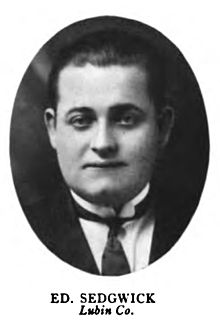Edward Sedgwick
| Edward Sedgwick | |
|---|---|
 |
|
| Born |
November 7, 1889 Galveston, Texas, U.S.A. |
| Died | March 7, 1953 (aged 63) North Hollywood, California, U.S.A. |
| Cause of death | Heart attack |
| Resting place | Holy Cross Cemetery, Culver City |
| Nationality | American |
| Other names | Edgar Sedgwick Ed Sedgwick Ed Segwick |
| Alma mater | St. Mary's University of Galveston |
| Occupation | Film director, screenwriter, actor and film producer |
| Years active | 1915–1953 |
| Spouse(s) | Ebba Havez |
Edward Sedgwick (November 7, 1889 – March 7, 1953) was an American film director, writer, actor and producer.
He was born in Galveston, Texas, the son of Edward Sedgwick, Sr. and Josephine Walker, both stage actors. At the age of four, young Edward Sedgwick joined his show business family in what was then the Sedgwick Comedy Company, a vaudeville act, doing a "singing speciality". He played child parts and did vaudeville acts until he was seven, when he was given his first comedy part, that of an Irish immigrant, in a comedy written by his father called Just Over.
During this time, he was only on stage during the summer months. In winter his father took him back to Galveston and sent him to school. He graduated from St. Mary's University of Galveston, and was then sent to the Peacock Military Academy in San Antonio, from which he graduated with the rank of first lieutenant. After graduation, he seriously contemplated a military life but the lure of the stage proved stronger and so he rejoined his father's company, now known as "The Five Sedgwicks." The troupe consisted of his parents, himself and his two sisters. Forced to close the act through the father's illness, Sedgwick went into musical comedy and soon had a company of his own, known as "The Cabaret Girls," produced, directed and managed by himself. The company was very successful, and it was only after repeated offers from Romaine Fielding that he was induced, at the end of his third successful season, to disband his company and become a film-actor.
The two other family members were Edward's twin sisters Eileen and Josie Sedgwick, who both later pursued successful silent-movie acting careers. Sedgwick broke into films as a comedian in 1915, frequently cast as a zany baseball player. He then became a serial director six years later in 1921, and moved on to the Tom Mix western unit. Sedgwick's love of baseball came in handy for the ballpark sequences of Mix's Stepping Out, Buck Jones’ Hit and Run, William Haines’ Slide, Kelly, Slide, Buster Keaton’s The Cameraman, and Robert Young’s Death on the Diamond.
...
Wikipedia
